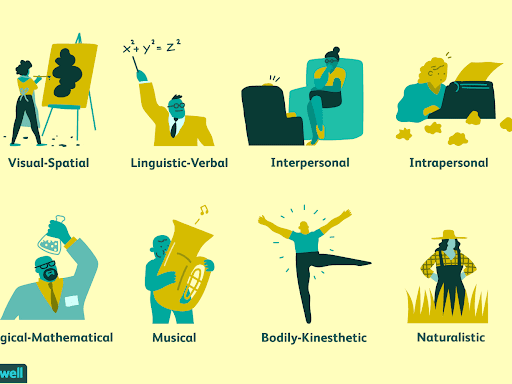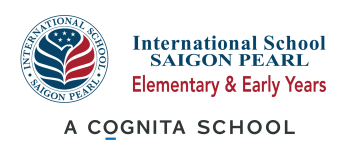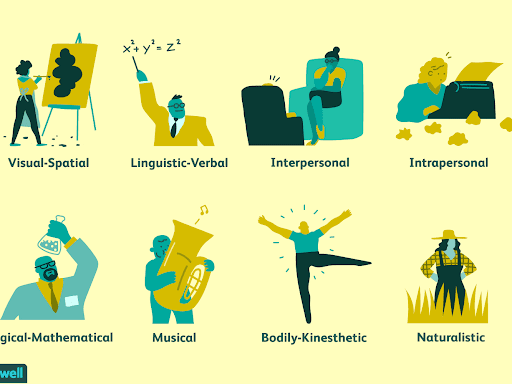Contents
What are types of intelligence? Have you ever wondered why some people are better at sports and have better coordination, others pick up language and words faster when they were a child, while others are better at numbers and finding the rules? According to Dr. Psychology Howard Gardner: Children have up to eight types of intelligence, and depending on what kind of intelligence your child possesses, parents need to know well to be able to guide the development of their children’s abilities. So, please read the following ISSP article to gain a better understanding of what are types of intelligence and find out the right learning environment for your child!
What are types of intelligence? 8 types of intelligence
“What are types of intelligence?” – This is the question asked by many people. Not all of us have the same innate skills. In 1983, Gardner first outlined his hypothesis in his book Frames of Mind and suggested that all people have different types of intelligence.
Gardner hypothesized that humans possess a variety of intelligence, including musical, communicative, spatial, and linguistic intelligence, in addition to intellectual ability. Some may have specific strengths in certain areas, such as musical intelligence, while many are intelligent in other areas, such as interpersonal, geometry, and language. Your high score in one category does not necessarily affect your score (high or low) in another.
Howard Gardner’s research on multiple intelligences suggests that people aren’t born with all the intelligence they would and that everyone processes information differently. In other words, parents continue to learn and grow in different ways throughout our lives, even after we complete our formal education.
>> Read more: How Schools Ensure Student Success

Spatial Intelligence
Did you know about spatial intelligence? It’s the ability to think, remember, and create with images, colors, and space. Children with this intelligence are awesome at visualizing and understand better when things are explained with pictures. They don’t like boring words! They can even turn images into characters in their memory. Imagine standing still but being able to see things from many different angles. That’s how they think – in a super cool, multidimensional way! If your child scores the highest in this category, their thinking will lean towards reasoning, association, using geometry, and shapes. How cool is that?
Representing the group of people with spatial intelligence – visuals can be mentioned as sculptors, painters, inventors, architects, mechanics, engineers…
Expression:
- Be interested in reading and writing
- Be talented in interpreting pictures, graphs, and charts
- Likes coloring, painting, and visual arts activities.
- Easy identification of prototype models.
How to develop:
- Teach children to observe phenomena around them, from simple objects, such as flowers that bloom in the garden when you take them for a walk, or toys that float and sink when you drop them in the bath…
- Have your child experiment or do simple experiments.
- Teach your child to use the simple Casio calculator (for children aged 5 and up).
- Play chess such as chess, chess, seahorse chess…
- Let the children solve the model problems they have learned.
- Explain to children that objects they observe can be grouped by color, shape, or other features.
>> Read more: Play-based learning: What it is and Why it is essential for kids? – ISSP

Linguistic intelligence
Linguistic intelligence is the ability to use language effectively to express oneself eloquently, and poetically, and to have the ability to learn, speak, and memorize in languages. Linguistic intelligence is expressed through the human use of words in writing and communication. They can express opinions clearly, articulately, and skillfully. Your children with this intelligence also possess a long-term memory of each event and clear details.
Manifestations of a person with linguistic intelligence include an interest in reading and writing; easy to remember information; sensitivity to the semantics of words; often enjoys participating in debates; confidently communicating verbally; loves to tell stories etc.
Writers, poets, lawyers and speakers, foreign language teachers, linguists… are representatives of this intelligence.
Expression:
- Retains well-written information and can express it orally.
- Children love to read and write.
- Stand out when they deliver a persuasive speech or make a point.
- All problems can be explained clearly.
- Usually humorous.
How to develop:
- Read books with your child
- Listen carefully to your child’s questions and experiences.
- Encourage your child to tell you the story they just read.
- Encourage your child to read and take them to the bookstore regularly.
- Have the children write on the classroom wallpaper.
>> Read more: The international learning environment at International School Saigon Pearl (ISSP)

Logical-mathematical intelligence
The next of the eight types of intelligence is mathematical and logical intelligence. So what is mathematical intelligence? People who possess mathematical intelligence can analyze, solve problems, and logically interpret them. It is a group of components that tend to favor numbers, systems, and models.
If your children fall into this category, they often think about relationships between things, numbers, and how things work. Children with mathematical intelligence tend to like to study math and think about abstract ideas and definitions.
Expression:
- High problem-solving ability
- Children love to think of abstract ideas
- Have a passion for science experiments
- Good at solving complex calculations
How to develop:
- Let the kids do a few simple experiments.
- Teach your child how to use a tablet (for children aged 5 and up).
- Play chess like chess, chess, etc.
- Have your child solve model problems as seen in class.
- Explain that objects your child observes can be grouped by color, shape, or other features. Play the game of arranging objects into groups of similar properties and help children draw shapes of these objects on paper to make diagrams to make them more concrete. Go ahead and discuss the cause of your differences with your child.

Musical Intelligence
Particularly, the phrase “musical intelligence” almost speaks to the ability and inclination of its owners. Students with musical intelligence are often more sensitive to sounds and often pick up on sounds that other people wouldn’t normally recognize. They have a great sense of rhythm and the ability to recognize tone and pitch. They often play an instrument or engage in music as a profession.
Expression:
- Children love to sing and play musical instruments
- Easily recognize different musical patterns and instrument sounds
- Learn songs and tunes quickly
- Deep understanding of musical structures, song rhythms, and musical notes
How to develop:
- Let your child choose a song at a record store
- Have your child sing or clap to the music. If possible, involve your child in music lessons.
- Give your child the opportunity to attend musical performances and concerts.
- Get your child involved and lead classmates to sing a song or join a musical group.
>> Read more: 10 Secrets on How to make your kids smarter – ISSP

Intrapersonal Intelligence
Intrapersonal Intelligence also known as inner intelligence, this type of intelligence refers to individuals who are highly aware of their feelings, goals, and desires. They can make their plans to make decisions and achieve goals.
If children have inner wisdom, they can analyze their strengths and weaknesses; their sense of self is very clear; your child likes to analyze assumptions and hypotheses, etc.
Expression
- Your child has excellent communication skills, including nonverbal and verbal communication
- Babies can distinguish things from many aspects.
- Usually a team conflict solver, etc., and most likely someone with social intelligence.
How to develop:
- Play family games with your baby.
- Encourage your child to participate in group activities.
- Encourage your child to discuss and solve problems.
- Assign your child the role of a leader when dividing study groups in the class.

Bodily-kinesthetic Intelligence
Students with high body-motor intelligence have excellent timing and excellent body-mind coordination as well as fine and gross motor skills. They can use their bodies to communicate feelings and ideas, so they often take on roles in dance, sports or medicine. These children use their bodies to solve problems and create something meaningful. These individuals will for the most part tend to have excellent hand, foot, and eye coordination.
Expression:
- Very good at dancing and playing sports.
- I love to create with my own hands.
- Smooth coordination of organs and senses.
- Capable of remembering through doing rather than hearing or seeing.
How to develop:
- Engage children in dance, theater and sports activities such as: Hiking, jogging, tennis, cycling… with family.
- The PE teacher can ask the children to practice with the class to do the exercises.
>> Read more: Why is mental health important for students?

Interpersonal Intelligence
The ability to interact effectively with others. Be sensitive to the moods, emotions, temperaments, and motivations of others. It can understand and relate to the people around you.
Expressions:
Your child has excellent communication skills, including nonverbal and verbal communication.
They can distinguish things from many aspects.
How to develop:
- Play family games with your children.
- Encourage your child to participate in group activities.
- Encourage your child to discuss and solve problems.
- Assign your child as the leader when dividing study groups in the class.
Naturalistic intelligence

The last of Gardner’s eight types of intelligence is natural intelligence. You will have a penchant for being passionate about nature, such as animals, plants, etc.
If your children possess this intelligence, they are usually interested in farming, nurturing, learning about species, as well as camping and climbing activities. You feel a certain harmony with nature and plants and have a passion to explore that world.
Expressions:
- Children are often interested in subjects such as biology. botany and zoology
- The ability to categorize and catalog information easily
- Tends to enjoy camping, gardening, hiking and outdoor activities
- Children may not want to learn strange subjects that have nothing to do with nature
How to develop:
- Expand children’s understanding of scientific phenomena by observing similar phenomena in life and nature.
- Help your child repeat the experiment. However, changing influencing factors. For example, show your child how plants grow under the light of a lamp.
- Before changing these influencing conditions, teach your child what to expect before the experiment.
Holistic development of children at International School Saigon Pearl
The curriculum at International School Saigon Pearl (ISSP) will focus on developing all types of intelligence. If parents are confused about which international school is suitable for their child’s development orientation, ISSP will be an ideal educational environment.
The curriculum at ISSP is an integrated international program built on American standards, standards of the Ministry of Education and Training of Vietnam along with the IB PYP curriculum framework, which affects the comprehensive development of students and helps them become model global citizens.

At ISSP, in addition to classroom learning, students can participate in many extra-curricular activities such as sports activities (soccer, basketball, volleyball), visual arts activities, STEAM activities, language development activities… These activities provide opportunities for students to grow in height, develop physically, and more.
Moreover, to develop the intelligence of students, ISSP always focuses on training and selecting carefully. 40% of teachers at ISSP have a master’s degree in the subject they teach. All teachers at the school are highly qualified and have international qualifications and certifications such as the Making the PYP Happen Certificate, the TESOL certificate (the international English language teaching skills and methods), the Child Protection Certificate for International Schools from the British Council of International Schools, the Postgraduate Certificate in International Education (PGCE). The recruitment at ISSP is carried out according to a strict process with common standards in the education industry and specific standards for international and school education. This also helps parents feel more secure when sending their children to an international school.
ISSP also regularly organizes training sessions for teachers on child safety and protection programs, child psychology, how to behave with children… This helps each teacher interact and support their students better.
For more information about specific facilities or programs, parents can schedule a school tour or contact ISSP Admissions Office via the following contact methods:
- Phone number: +84 (028) 2222 7788
- Email: admissions@issp.edu.vn
This blog will give parents more insight into what are types of intelligence. Remember that every child will possess a different type of intelligence. Get your child involved in more activities so that parents can find out their child’s strengths. And if parents want to find what are international schools, or good reasons to choose an international school, just visit International School Saigon Pearl website for more useful information.







